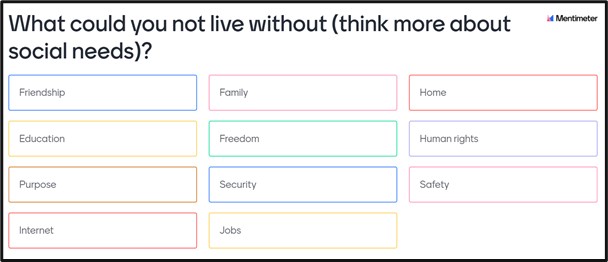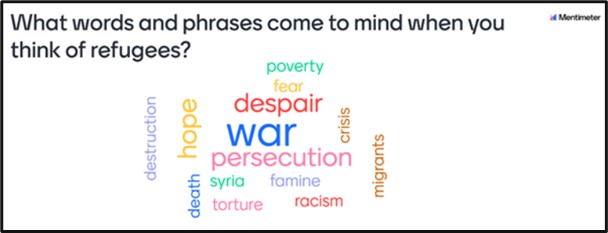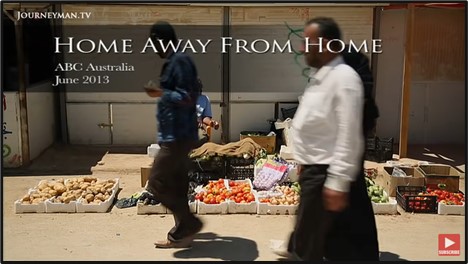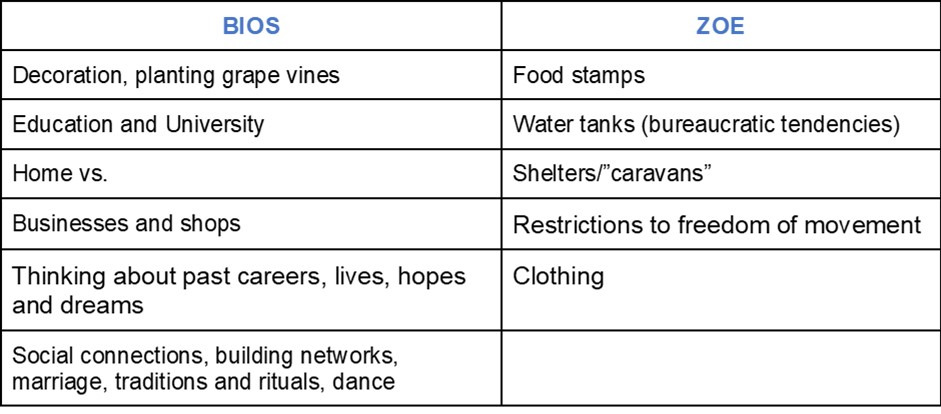(2021-2022) Deconstructing the Refugee: Understanding both the biological and the social lives of refugees
Written by Brendan Cox, Tom Cranston, Siân Farley, Nanditha Plakazhi, Alice Putter, and Louisa Wates
**Trigger Warning**: This class discusses the topic of refugees, which may be uncomfortable for some students. The teacher’s discretion is advised.
Lesson Aims
- To question and challenge contemporary assumptions of what it means to be a refugee.
- To look at ‘refugeeness’ through an anthropological lens, using the concepts of ‘bios’ and ‘zoë’.
- To apply the concepts of bios and zoë to a case-study.
Resources and Basic Requirements
Student requirements:
- Access to an internet-enabled device
- Pen and paper
Teacher requirements:
- Computer with projector
Background for teachers
According to the United Nations Refugee Convention (1951), to be recognised as a refugee, an individual must fulfil three sequential conditions: fear of being persecuted for reasons of race, religion, nationality, or political opinion; having crossed an international border and being outside their national country and thus, having lost the protection of their country of origin. However, such definitions have attracted criticism in the social sciences because these criteria tend to homogenise refugee identity, rendering it little more than survivalism. Alternatively, anthropologists have proposed that it is perhaps better to understand ‘refugeeness’ through ethnography. In Anthropology, this means studying a group or culture from the perspective of that group. For this lesson, the anthropological approach involves looking at how refugees actually live, rather than how they survive.
This way of thinking is founded on the work of Giorgio Agamben, an Italian philosopher, who originally theorised this difference between surviving and living as two separate lives; one biological (or ‘zoë’), the other social (or ‘bios’). Agamben observed that the Ancient Greeks had two different words for “life” which they divided into bios and zöe (Holmes, 2019). Agamben conceptualises zöe as the biological life or bare life; implying no guarantees about the quality of the life lived (Oxford Reference, Bare Life). We can think of zöe as basic human needs such as food, shelter, water, and warmth. Conversely, the Greeks viewed bios as contemplative life; a life of practical virtue. To succeed in bios, one must achieve happiness (Finlayson, 2010). Agamben views bios as something more pragmatic, defining it as the life and language of politics. We can view bios as people being involved politically; having passions, access to education, the ability to be socially fulfilled within a community, and the freedom to express oneself.
Brief for Students
Anthropology is a social science that involves the study of human societies and cultures. Its researchers, called anthropologists, study cultural phenomena from the perspectives of different people. This area of research is based upon the challenging of assumptions and generalisations; this practice can be referred to as ‘deconstruction’. In the context of this lesson, you will use this anthropological way of thinking to deconstruct the refugee.
To do so, you will first learn about what the word ‘refugee’ means. You will then deconstruct your own perspectives on refugees, after which you will deconstruct the lives of refugees by learning about two anthropological concepts; ‘bios’ and ‘zoë’. These concepts will be used to explain the differences between mere survival (zoë) and fulfilled living (bios). The lesson will finish with an interactive discussion of a case-study, taken from a documentary about a Syrian refugee camp.
Lesson Plan
Section 1: Interactive Introduction
The aim of the introduction is to interactively lead the students from their ideas of ‘living’ and ‘surviving’ towards Agamben’s theory of bios and zoë. The students will need access to the webpage https://www.menti.com/
The first question is: “what do you need to survive?” This question will appear on their devices, and they will be able to anonymously submit their answers. These answers will appear on the teacher’s screen as a ‘thought cloud’ for the whole class to see.
Example of a possible ‘thought cloud’:

A few moments should be given for the class to view and discuss the answers and for the teacher to acknowledge the diverse perspectives on what is considered important to survival.
The second question is: “what do you need to live?”. This question is supposed to lead the students towards broader thinking. The students should be given some time again to compare their answers and contemplate the differences between surviving and living.
Example of a possible ‘thought cloud’:

Section 2: Context
The third Mentimeter question asks the students to submit word associations relating to the term ‘refugees’. This question enables the teacher to gain an idea of the class’s various perspectives, rather than making preconceived assumptions about their opinions. A safe space should be created, so that students can consider the emotional effects that their answers might have on their fellow classmates. This encourages a respectful atmosphere in which their discussions may take place.
The aim of this exercise is not simply to tell the students what perceptions they should have on refugees, but rather to animate them to rethink their perspectives together, through discourse.
Example of a possible ‘thought cloud’:

After a discussion of these Mentimeter thought clouds, the teacher should then provide some background information on refugees, connecting it to the students’ discussions. This will include some statistics and definitions.
Following this, the teacher will deliver an account of Agamben’s theories of bios and zoë, through the analogies of living and surviving. The students will gain a deeper understanding of these modes of life and can use them to challenge their prior views on refugees.
Often, refugees are portrayed – and therefore treated – as dehumanised people who are stagnating in a ‘survival mode’. The students will begin to understand that refugees’ existence is more complex than this.
Section 3: Case Study

“This is a short documentary about Zaatari refugee camp in Jordan, whose occupants are Syrian citizens who fled the civil war. The camp was intended to be temporary, yet it is now ‘home’ to over 100,000 people. It is a ‘home away from home’. The documentary follows the life of one family; Abu Diaa, Samar, and their children.”
Clips:
|
Clip |
Title |
Timestamps |
Clip Link |
|
1 |
Entrepreneurship in Zaatari |
14:00 – 16:04 |
|
|
2 |
Water Rationing |
18:21 – 18:49 |
|
|
3 |
The Loss of Education |
20:20 – 21:24 |
The class will search for examples of bios or zoë in the clips, after which will follow several discussions. Allow two minutes of discussion per clip; prompt questions might be as follows:
- Why might education be more important to Samar than food or clothes?
- Does the presence of ‘businesses’ in a refugee camp surprise you? Why?
- What might be a problem with water rationing in a refugee camp?
Potential examples of ‘bios’ and ‘zoë’ in the clips:

Section 4: Conclusion
This section marks a conclusion, by way of a return to the word association Mentimeter: ask the class if they would like to change anything. Why and how might their perceptions have changed?
Bibliography
Finlayson, J. (2010). “Bare Life” and Politics in Agamben’s Reading of Aristotle. The Review of Politics, 72(1), 97-126. doi:10.1017/S0034670509990982
Holmes, B. (2019). “Political Concepts, A Critical Lexicon,” viewed 20/11/2021, https://libguides.scu.edu.au/harvard/websites
Oxford Reference. (2021) Bare life https://www.oxfordreference.com/view/10.1093/oi/authority.20110803095446660.
UN General Assembly. (1951). Convention Relating to the Status of Refugees. United Nations, Treaty Series, vol. 189, p. 137, available at: https://www.refworld.org/docid/3be01b964.html [accessed 20 November 2021]

0 Comments